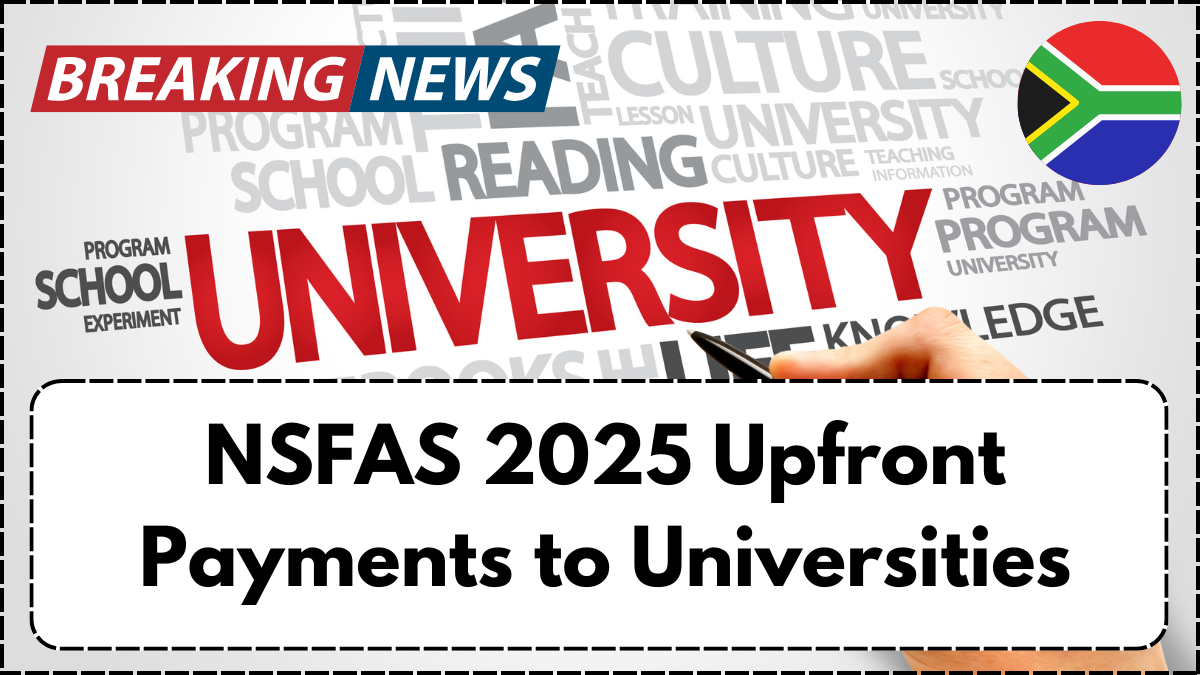As the 2025 academic session gets underway, South African universities are preparing for an influx of students. The National Student Financial Aid Scheme (NSFAS) remains instrumental in providing financial assistance for tuition, housing, and living costs. To streamline the registration process and prevent funding delays, NSFAS has issued upfront payments to universities and colleges. This initiative highlights the government’s dedication to making higher education accessible and ensures institutions can enroll students without financial setbacks.

Why Are NSFAS Upfront Payments Crucial?
Many students depend on NSFAS funding for their studies. In previous years, delays in fund disbursement led to disruptions in registration and academic schedules. To resolve these issues, NSFAS released upfront payments on January 10, 2025. This strategic move enables institutions to allocate necessary funds before the academic year begins, minimizing administrative hurdles.
Detailed Allocation of NSFAS Upfront Payments for 2025
The upfront payments cover various essential student expenses, ensuring a seamless academic start.
| Category | Allocation Breakdown |
|---|---|
| Student Allowances | One month’s allocation for personal needs, transport, books, and sustenance. |
| Book Allowance | 50% of the annual book allowance provided upfront. |
| University Grants | 9.5% of the total R39 billion budget for 2025. |
| College Tuition Funds | Direct disbursements to TVET colleges for tuition fees. |
These payments empower universities and colleges to enroll students without obstacles, ensuring a smooth transition for all learners.
Challenges in Higher Education: Rising Demand vs. Limited Capacity
Despite outstanding matric performance in 2024, South African universities continue to struggle with space shortages.
Key Higher Education Statistics:
- Matric Pass Rate 2024: 87.3%—one of the highest on record.
- Bachelor’s Passes: 337,158 students qualified for degree programs.
- University Seats Available: Only 202,000 first-year slots exist.
University Enrollment Shortfall Trends
| Year | Bachelor Passes | University Capacity | Deficit |
| 2024 | 337,158 | 202,000 | 135,158 |
| 2023 | 324,226 | 200,000 | 124,226 |
| 2022 | 312,000 | 198,000 | 114,000 |
The growing demand for higher education is straining government resources, university infrastructure, and accommodation availability.
NSFAS Enhancements in the Application Process
To improve efficiency, NSFAS has refined its application system to finalize funding decisions before the academic year starts.
NSFAS 2025 Application Processing Overview
| Application Category | Current Status |
| SASSA Beneficiaries | 658,943 applications received, 606,113 approved. |
| Non-SASSA Applicants | 276,072 applications under review, 201,848 verified. |
| Student Loan Requests | 17,370 applications awaiting financial assessment. |
Students still awaiting confirmation should regularly check their NSFAS portal for updates and ensure their documents are complete.
Encouraging TVET Colleges as an Alternative Path
With limited university capacity, the Department of Higher Education and Training (DHET) is advocating for Technical and Vocational Education and Training (TVET) colleges as an alternative route to career success. These institutions focus on hands-on training aligned with industry demands.
Advantages of Choosing TVET Colleges:
- Practical Skills: Programs designed for direct workforce entry.
- Entrepreneurship Opportunities: Equips students with business skills.
- Industry-Relevant Training: Curricula aligned with labor market needs.
- Government Investment: Improved infrastructure and resources.
- Recognized Qualifications: Certifications accredited by the Quality Council for Trades and Occupations (QCTO).
TVET colleges are also strengthening ties with industries to provide students with valuable hands-on experience before graduation.
Addressing Student Housing and Transportation Issues
To enhance student welfare, Minister of Higher Education Dr. Nobuhle Nkabane has established a special task force to tackle accommodation and transport challenges.
Task Force Composition:
- NSFAS Representatives
- Higher Education Officials
- Student Housing Providers
- Transport Service Operators
This initiative aims to offer affordable, safe housing and reliable transport, removing logistical barriers that hinder student success.
Frequently Asked Questions (FAQs)
1. Why are NSFAS upfront payments important?
Upfront payments allow institutions to process student registrations efficiently, covering tuition, accommodation, and allowances before the academic term starts.
2. When were the NSFAS upfront payments for 2025 disbursed?
NSFAS distributed the funds on January 10, 2025, ensuring institutions could allocate resources promptly.
3. What does the student allowance cover?
The student allowance supports living costs, transport, books, and personal necessities.
4. Why should students consider TVET colleges?
TVET colleges provide career-ready skills, hands-on training, and industry-aligned education, making them a viable alternative to universities.
5. How is the government tackling student accommodation challenges?
A task force has been formed to develop affordable, safe housing solutions for students across the country.
6. What should students do if their NSFAS application is still under review?
Applicants should regularly check their NSFAS portal and ensure all required documents are submitted to prevent delays.
By implementing these strategic measures, NSFAS and the South African government are actively enhancing student access to higher education. These initiatives play a crucial role in shaping the nation’s academic landscape and empowering future generations.
Click here to learn more
Pari is a passionate writer known for captivating stories that blend imagination and reality. Inspired by travel, history, and everyday moments, Pari crafts narratives that resonate deeply with readers.